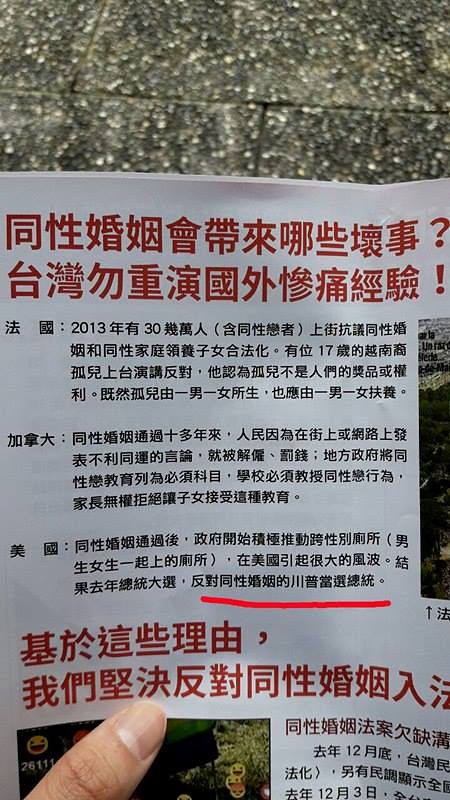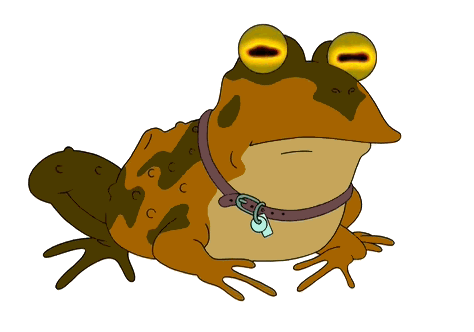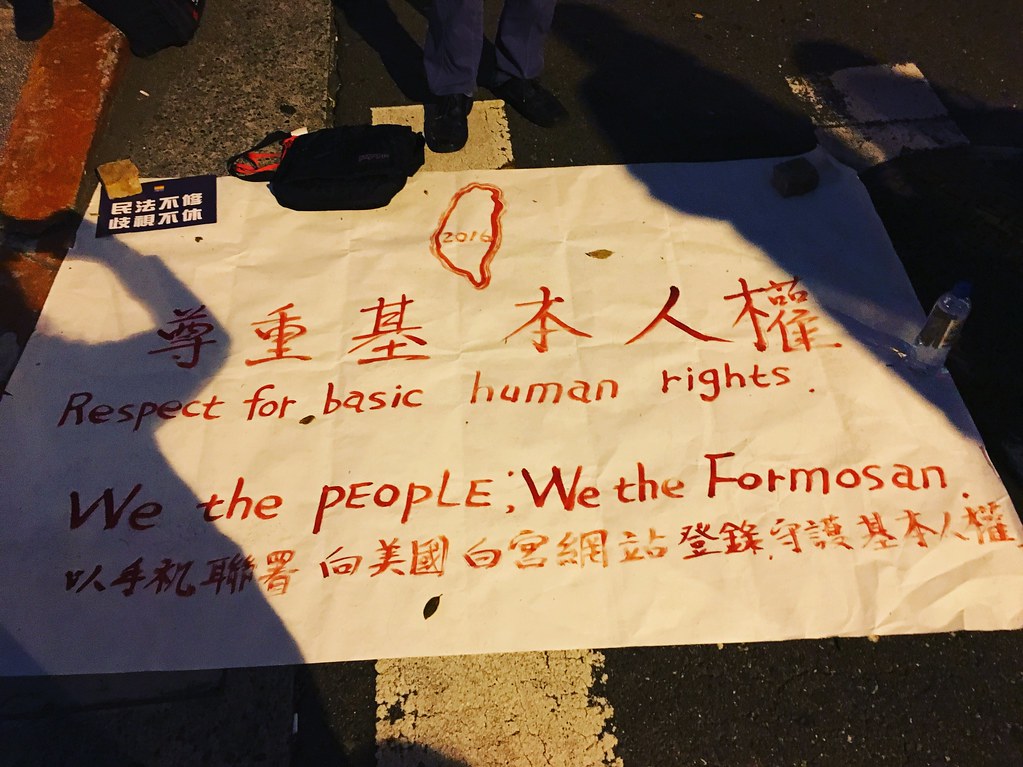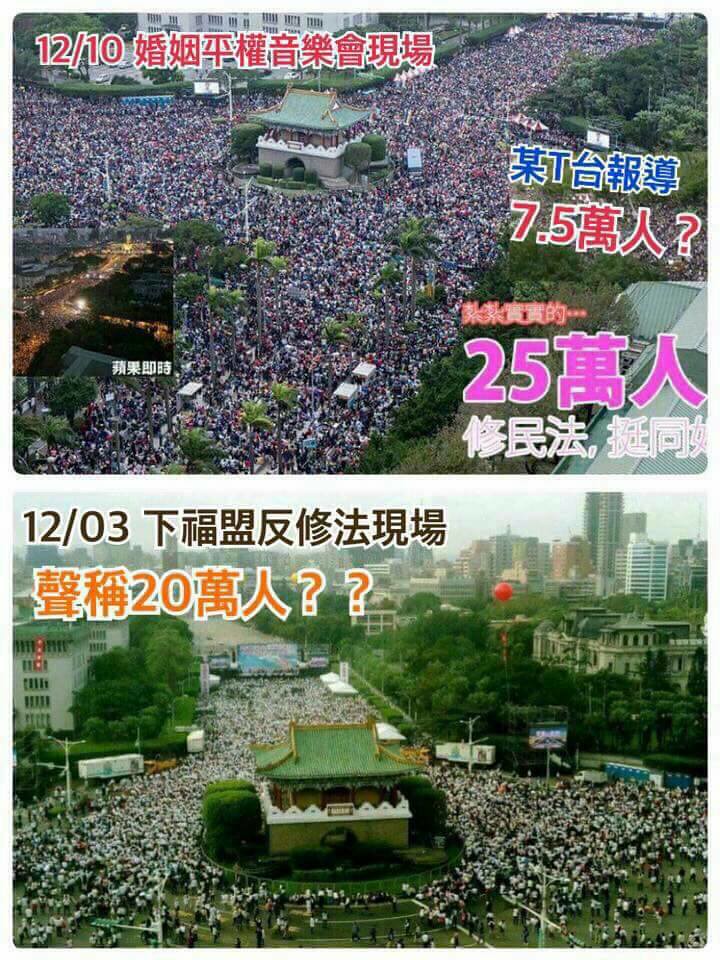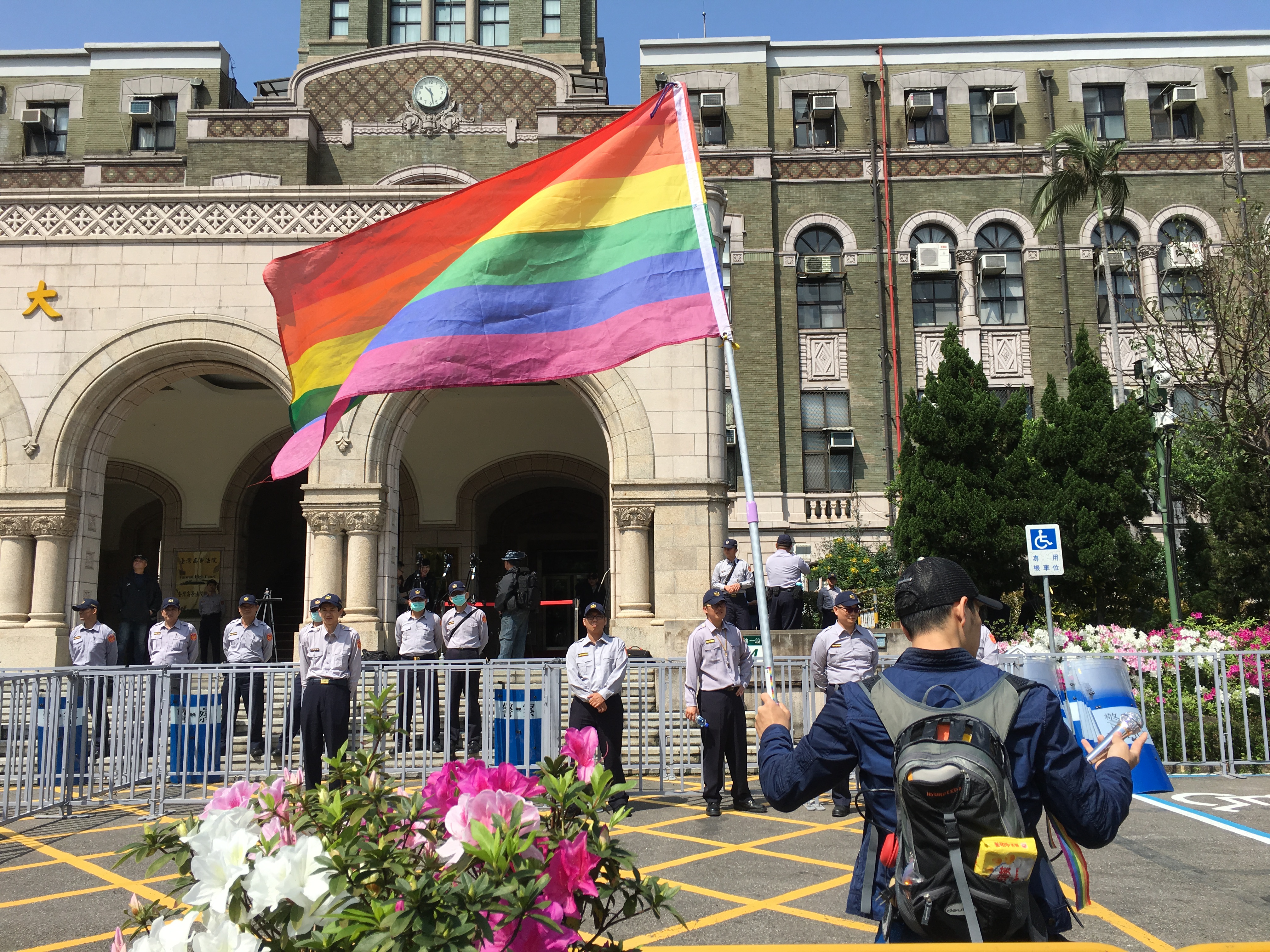
I just can't.
Even.
I wish I had more to say about the demonstrations in front of the Judicial Yuan on Friday, but truth be told, they were tiny. I tend to agree with Brian Hioe that the reason was likely not that it was a work day (a lot of people who show up are students, and previous government actions have caused far larger rallies during work hours). Most likely, it was due to a general feeling that pushing for marriage equality through the Judicial Yuan is either not likely a fruitful path, or that these oral arguments were not particularly significant.
It seems a few more people did show later in the day (I was only able to go in the morning) but while I was there, it was a slew of police officers there for security against what was maybe 20 people. I was sad to see so few, but honestly, during my stopover, there were no anti-equality demonstrators. So we still had them beat 20-to-0! (I'm told that a few did eventually show up, but I was long gone).
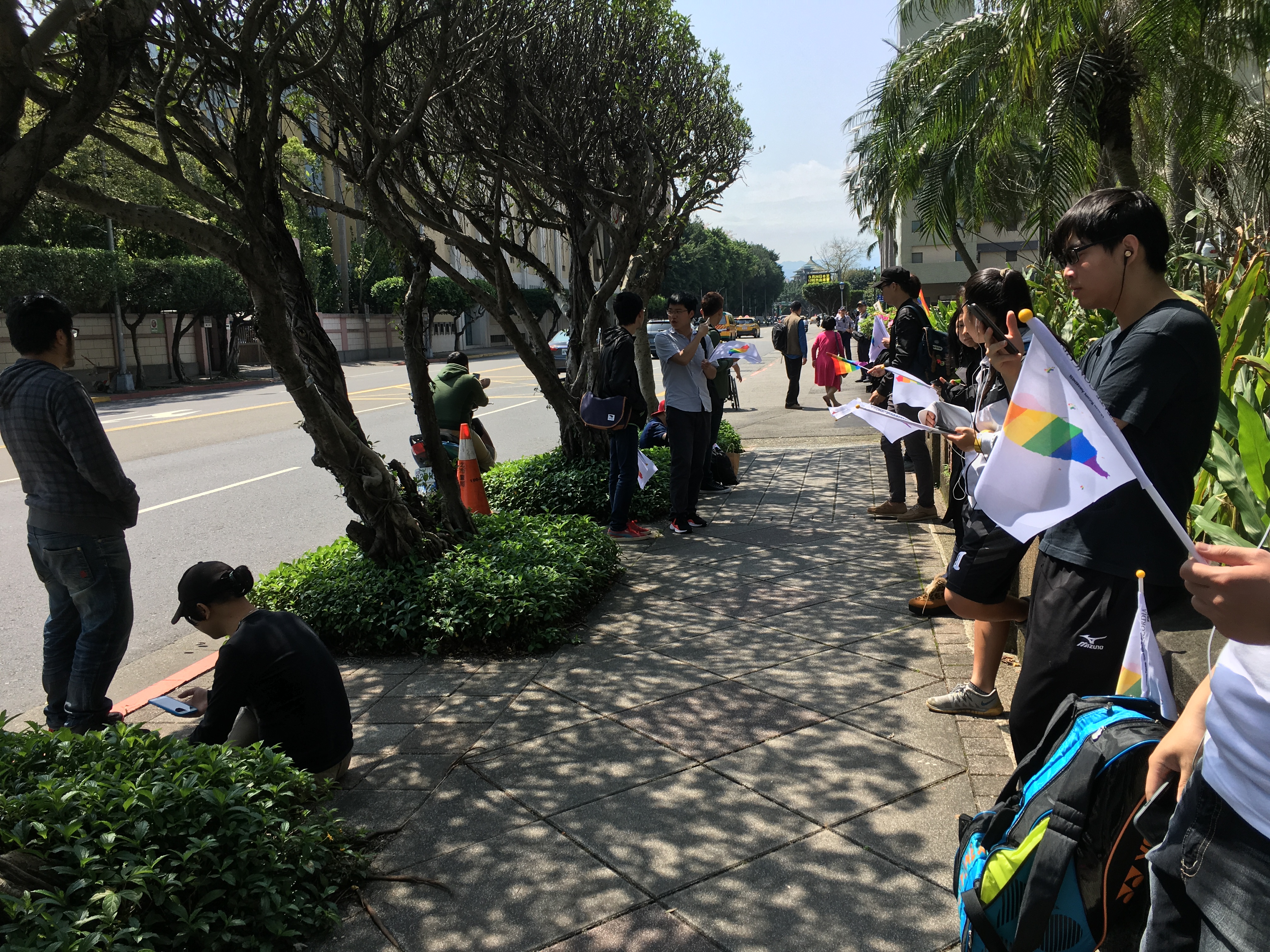
Otherwise, I have little to say that hasn't already been said over the weekend, and I just don't know what to say about Justice Minister Chiu Tai-san's argument. Chiu - who is a Tsai appointee, remember - argued so strongly for inequality that it seemed to surprise even more conservative voices.
From Michael Turton:
Our DPP Justice Minister revealed himself to be not only a retrograde thinker, but a Han nationalist to boot. Speaking on gay marriage at a hearing that was live streamed, Justice Minister Chiu Tai-san said:
“The Civil Code stipulates that marriage shall be between a man and a woman, and as such it is not unconstitutional. The Constitution guarantees citizens’ right to marry as that between a man and a woman, while marriage between people of the same sex is not covered under the Constitution,” Chiu said.
“For thousands of years in the nation’s history, society has instituted traditions and codes of conduct regarding marriage. Has there ever been a cultural institution or social phenomenon for same-sex marriage?” Chiu said.
“For thousands of years in the nation’s history, society has instituted traditions and codes of conduct regarding marriage. Has there ever been a cultural institution or social phenomenon for same-sex marriage?” Chiu said.
“Without a doubt, there has been none,” Chiu said.
He then quoted one section of the Chinese classic I Ching (易經), also known as the Book of Changes, which reads: “With the existence of the earth and the sky, there came all living things. With the existence of the earth and the sky, there came men and women,” which he said illustrates that Chinese marriage traditions have — since ancient times — been based on a union between a man and a woman.
It was unclear at first whether his views were meant to represent the Executive Yuan until Premier Lin Chuan explicitly remarked that they weren't.
In any case, what the fuck is wrong with you, Chiu Tai-san? Like, what the hell even? You know quite well that the person who appointed you disagrees with you, you know quite well (whether you want to admit it or not, you crusty old shitlord) that the general consensus of society is against you, and you must know by now that you are hurting, not helping, the administration that you currently depend on for your job. They need the youth vote, and if government officials keep mouth-pooping turds like this, they won't get it.
Queerious said it best:
It is unknown whether Chiu consulted the President or the Executive Yuan prior to the oral arguments, but there are only two possible scenarios here. In the first scenario, he discussed his testimony with the presidential office and the Executive Yuan and they gave him the go ahead. In the alternative, he did not speak to them, and neither the presidential office nor the Executive Yuan had the forethought to vet his arguments to ensure that they would not be an embarrassment to the government that still claims to support marriage equality. Both scenarios are unacceptable to marriage equality supporters and may be indicative of a dysfunctional government that fails to understand the real-life consequences of its ineptitude and passiveness.
(If you are wondering why my two long quotes are formatted differently, it's because I don't know how to fix that).
But what makes this word turd from Chiu especially stinky is that he's straight-up wrong. Marriage has not, through history, in basically any culture, been "one man and one woman". That's a relatively recent phenomenon, and honestly, something of a heavily Christian-tinged one. In China, the most well-known kind of ancient marriage was one man with many wives, but here you can see there is a whole list of other possible choices. (Michael is slightly incorrect, by the way - I didn't track down that website, my husband did as he joked that if Taiwan were going to go back to traditional notions of Chinese marriage, that I ought to ready the guest room for his second wife).
One that it doesn't mention - you can also marry a ghost (but apparently not your real-life human lover and partner of many years, if you happen to have the same genitals).
It almost feels like Chiu and his ilk are taking arguments that sound like Western-style "Christian" arguments against equality, and using them to somehow justify it "in Chinese culture". Gee, I wonder where they got that rhetorical tactic? It hints vaguely at Chinese nationalist "5000 years of culture" type nonsense but has a distinctly church-of-hateful-people tinge to it.
Of course, arguments about whether homosexual unions are compatible with Chinese culture are meaningless, especially in Taiwan, because Taiwan is not a part of China. Frankly, I was somewhat surprised to hear this line of argument from someone in the DPP, especially someone whose political past is associated with pushing the DPP to more strongly embrace Taiwan independence. Tai-san, buddy, do you really hate TEH GAYS so much that you'd adopt pro-China, Han nationalist rhetoric? Really? What the fuck man?
In any case, who gives a shit what is "traditional Chinese culture", at least when it comes to Taiwan? Not only does culture evolve, as it may in China, but arguing this is like arguing that we can't embrace progressive social ideals in the US because they are not a part of traditional, oh, I don't know, Celtic culture in ancient Britannia. Or something.
What Taiwan has been doing since the end of the authoritarian era is figuring out what Taiwanese culture is, and how it is distinct from Chinese. I am not Taiwanese and cannot speak for Taiwan, but I will say that my observations have led me to believe that Taiwanese culture embraces a level of tolerance not found in China, and a live-and-let-live attitude outside of one's own family (intra-family dynamics may be another story, but can vary quite a bit). People have labeled Taiwan as conservative: I don't think so. We wouldn't be here fighting for Taiwan to be the first nation in Asia to embrance marriage equality with a realistic chance of winning, if it were. People have labeled Taiwan as 'traditional' and the Taiwanese as 'obedient' or 'unwilling to speak up'. I don't buy this either. First, it's a blanket stereotype. Second, this is a nation prone to rebellion, settled first by seafaring indigenous people and then by people who were not always even considered Chinese, and in any case were often the travelers, rabblerousers and assorted rebellious types on the continent (would you decide to move to an offshore island and most likely work for the Dutch if you were an established, conservative scion of Minnan society?) Third, this is a nation of people who, despite being told at every turn that they belong to some other greater power and being denied international recognition even when they claim it for themselves, refuse to give up and will take to the streets for what they believe in. Who wake up every day with 1300+ missiles pointing right at them and yet keep working to build a better nation, quietly insisting that it is, in fact, a nation while the entire world pretends they can't hear.
To me, this is not a nation of supplicants, it's a nation of rebels, or at least people with a rebellious streak, and I love it.
In such a nation, marriage equality is not a crazy notion. It fits perfectly. It doesn't matter if it's "Chinese" or not, because Taiwan is not Chinese. And marriage equality is - or at least can be - Taiwanese. Same-sex couples have been together since human beings have existed, and in recent decades they've been far more open about it. This isn't about radical social change: the change is already here. This is about an extension of the continuing fight for human rights in Taiwan, and about what kind of country Taiwan wants to be.
Queerious is right - marriage equality is a two-front war, just not, perhaps, in the way they think it is.
It's a two-front war as we fight Christian anti-equality believers on one hand, and "ANCIENT CHINESE CULTURE!" chauvinists on the other. In some cases, despite Christianity also not being traditionally Chinese, they seem to have teamed up.
And Chiu Tai-san can eat a dick.

